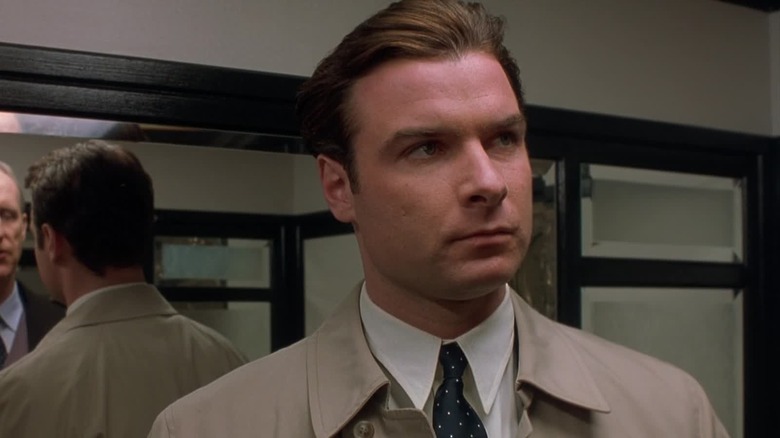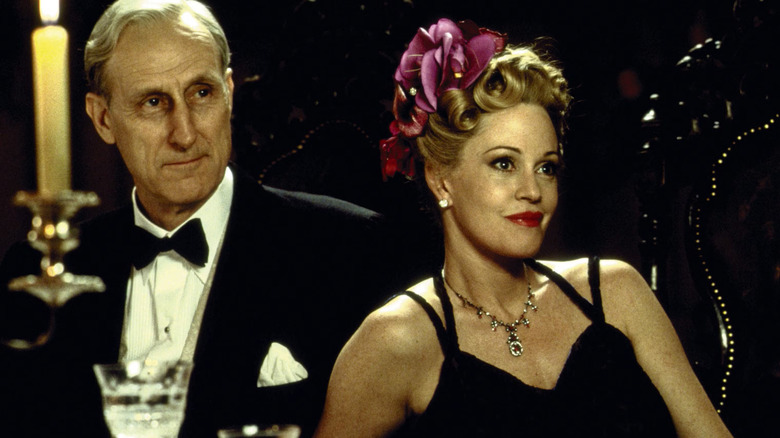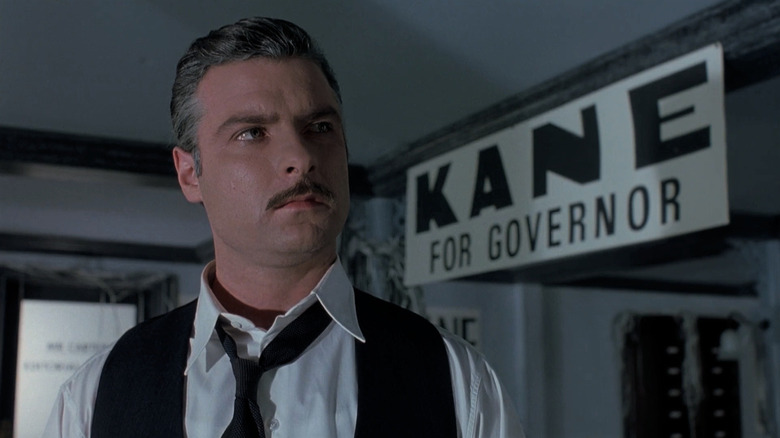Citizen Kane Fans Have To Watch This Overlooked HBO Movie
Given its monumental status as one of the greatest films ever made, it is perhaps surprising that there aren't more movies about the circumstances surrounding the making of "Citizen Kane." After all, beyond the technical dazzle of Orson Welles' magnum opus, it is also the story of a clash between two towering egos at opposite ends of their careers: In one corner Welles, the prodigiously talented upstart from New York who was handed the keys to Hollywood for his first motion picture; in the other, William Randolph Hearst, the fearsome magnate who dominated the largest and most influential media empire in the United States. It is also the tale of two sprawling estates that became monuments to their builders; Hearst Castle, an opulent testament to Heart's immense wealth, and Xanadu, Welles' gloomy fictionalized version of the former that would loom large over the rest of his career. Yet, to date, we only really have David Fincher's "Mank," which focused more on screenwriter Herman J. Mankiewicz's side of the story, and Benjamin Ross's "RKO 281," HBO's overlooked 1999 TV movie starring Liev Schreiber and John Malkovich.
Saddled with a clunky title (referring to the film's production number), "RKO 281" is a slick making-of drama based on the Oscar-nominated documentary "The Battle for Citizen Kane." Produced by Tony and Ridley Scott, it was originally envisaged as a theatrical release with Ridley in the director's chair, but the pair couldn't secure funding from a major studio and settled on making it for HBO instead. HBO Pictures still stumped up a considerable $12 million budget (that year's Best Picture winner, "American Beauty," only cost $3 million more), and just about every penny of it appears to be up on the screen via the lavish sets, period costumes, and an enjoyably stacked cast. However, the one thing that money couldn't secure was the rights to shoot scenes in Hearst Castle itself. Perhaps understandably considering the subject matter, Hearst's family refused to grant access to the filmmakers, leaving them to decamp to the U.K., where other suitably grand old buildings stood in for the real thing. There is plenty to enjoy in "RKO 281" for both "Citizen Kane" fans and movie buffs in general, although it ultimately falls short on a few important aspects. Let's take a closer look.
What happens in RKO 281
"RKO 281" whisks us back to 1940; there, the 24-year-old "Boy Wonder" Orson Welles (Liev Schreiber) has arrived in Hollywood to much fanfare, signing a deal with George Schaeffer (Roy Scheider) of RKO Pictures offering him unprecedented creative control over his first movie. The only problem is that the flashy wunderkind and his heavy-drinking screenwriter, Herman J. Mankiewicz (John Malkovich), can't quite settle on a subject. Eventually, Welles receives inspiration when the pair attend a star-studded soirée at the vast estate of media magnate William Randolph Hearst (James Cromwell), with whom the brash young genius butts heads over the dinner table. Observing the old man's stern and hypocritical ways, his ostentatious displays of wealth and power, and the awkward May-December relationship between Hearst and his alcoholic mistress Marion Davies (Melanie Griffith), Welles seizes upon the idea of making a biopic about Hearst's life.
Mankiewicz warns him against it because Hearst has a terrifying reputation for crushing his enemies and could bury Welles' Hollywood career before it even starts. Welles, however, will not be put off, so they begin working on a screenplay. Schaeffer is also worried about the costs, logistics, and Hearst's reaction, but he ultimately caves to Welles' passionate pitch, so "Citizen Kane" is a go picture. But Welles will discover that actually making the movie is the easy part, because trouble is brewing — stirred up by gossip columnists Hedda Hopper (Fiona Shaw) and Louella Parsons (Brenda Blethyn), Hearst declares war on Welles and his film.
"RKO 281" is a glossy and engaging film that, despite its starry cast and tip-top production values, can't quite escape the feeling of a made-for-TV movie. Clocking in at under 90 minutes, there is rarely a dull moment; it's a breezy whistle-stop tour of the behind-the-scenes drama that surrounded the production of "Citizen Kane," but it would no doubt warrant a six-part mini-series if it was made today. Some things clearly had to give with such a limited running time, and the actual making-of stuff is wrapped up in a few short scenes. As a cinephile who studied "Kane" at college, I would have appreciated far more of those details. Instead, "RKO 281" focuses more on the conflict between Welles, RKO, and Hearst. It does a pretty good job, although the film's brevity also means that the drama doesn't receive quite enough space to fully breathe.
The casting of RKO 281 is hit and miss
"RKO 281" evidently tries to get most of the facts and the period details right, but any movie portraying real-life celebrities invariably lives or dies in casting. That's where Ross's film is very hit-and-miss. I'm not saying that an actor needs to be the spitting image of a person to play them convincingly, as there are other ways to capture someone's essence on screen. Yet, Liev Schreiber and John Malkovich seem mis-cast as Orson Welles and Herman Mankiewicz, respectively. They are both terrific actors, but their own screen personae are so unique that I never once forgot I was watching Schreiber and Malkovich. Out of the two, Schreiber suffers the most because Welles' face and personality is far better known than Mankiewicz. He gives a decent performance, but it feels a little tentative, never fully leaning into Welles' trademark devilment and garrulous blend of smarm and charm. He also makes a game attempt at Welles' unmistakable voice, but even that wavers from scene to scene.
Having two of the three key parts in "RKO 281" mis-cast might sound disastrous, but thankfully, the supporting roles save the day. James Cromwell is authoritative as Hearst, an elderly tyrant with only the faintest inkling of a soul beneath the fierce exterior. He even allows us to feel a little pity for the man. Just a few years after his Oscar nomination for playing the kind-hearted farmer in "Babe," this and his chilling turn in "L.A. Confidential" put that cozy screen presence to bed. At his side, Melanie Griffith is arguably the M.V.P of the movie, providing heart and a touch of jaded wisdom as Marion Davies, a bird in a gilded cage who realizes she may have given up too much by committing her life to Hearst.
Further down the list, Roy Scheider, Brenda Blethyn, Fiona Shaw, Liam Cunningham, and David Suchet (shrewdly essaying Louis B. Mayer) all bring a touch of class to their roles. Despite misgivings about the two leads, the range of acting talent on display provides a richness and a depth that deserved a longer movie. Overall, "RKO 281" is an entertaining look behind the scenes that may not fully satisfy hardcore "Citizen Kane" aficionados, but it's a great jumping-off point for more casual fans who want to find out more about one of the best movies ever made.


